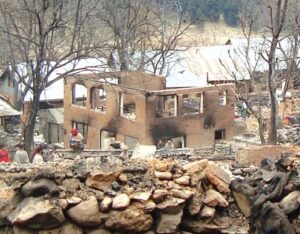
Shaheed Ghulam Rasool Dar (RA): A Humble, Focused, and Sincere Commander
By Zia-ur-Rehman Zia Shaheed (RA)
Almost two centuries have passed since the caravan of Syed Ahmad Shaheed (RA) camped by the banks of the Kunhar River. It, without any doubt, marked a pivotal moment in the history of Islamic resistance. After this extraordinary movement of Mujahideen in the subcontinent, no comparable uprising emerged to awaken the spirit of jihad among the region’s Muslims. While movements for independence against British colonial rule did surface, their primary goal was the expulsion of the British, a cause in which non-Muslims were also participants.
It wasn’t until the late 20th century, during the Soviet invasion of Afghanistan, that the Afghan nation found an opportunity to take the path of jihad. This resistance reignited the thirst for freedom in the hearts of Muslims worldwide. And then, out of the womb of the Afghan jihad, emerged the movement for the liberation of Kashmir.
In November 1990, another caravan set up their camp on the banks of the Kunhar River. Chilly winds from the river brushed through the curtains of a makeshift mosque in the heart of the encampment. Inside, young men gathered whose eyes were fixed on the commander addressing them from the mosque’s pulpit. His soul-stirring voice carried the weight of conviction that held the audience spellbound.
“You are not here because of external pressures; you joined this movement with the clarity of purpose and awareness. But this path demands sacrifice. Sacrifice one thing, and the next will stand before you. Our enemy is cunning and deceitful, with resources and manpower far superior to ours. But our strength lies solely in the help of Allah, upon whom we have relied from the beginning of this struggle. Despair has no place here. Instead, we must constantly beseech Allah for His assistance—He is our sole helper and protector.”
The voice belonged to Ghulam Rasool Dar, famously known as Ghazi Naseer-ud-Din Shaheed (RA). His words, brimming with wisdom and sincerity, inspired unity, confidence, and a renewed fervor among the Mujahideen.
For three years, Ghazi Naseer-ud-Din remained in the Base camp where he diligently trained the Mujahideen both ideologically and strategically. In 1993, he was commanded to cross back to occupied Kashmir, and he readily took to the battlefield. He was appointed Divisional Commander of Central Kashmir by Hizbul Mujahideen, a responsibility he embraced with tireless dedication. He trained the Mujahideen in guerrilla warfare and equipped them with skills that suited to modern-day combat. During this period, he became known by the alias Riaz Rasool.
In 1997, he returned to the base camp on organizational orders. Despite his family joining him at the camp, he spent most of his time with the Mujahideen and remained deeply connected to the struggle. His experience and insight were recognized, and he was inducted into Hizbul Mujahideen’s Central Command Council to enhance the movement’s military strategies.
In 2000, Hizbul Mujahideen’s leadership sent Commander Saif-ul-Islam to lead the Mujahideen in occupied Kashmir. Following Saif-ul-Islam’s martyrdom in 2003, Ghazi Naseer-ud-Din assumed the mantle of leadership. For nine months, he led the Mujahideen with great resolve, ultimately sacrificing his life for the noble cause of freedom and Iqamat-e-Deen.
On January 16, 2004, Ghazi Naseer-ud-Din Shaheed (RA) bore witness to his truth and devotion with his own blood. A man of humility and sincerity, he never prioritized personal gain over the sacred mission he had embraced. His life and ultimate sacrifice shine as a symbol of great dedication to the sacred pursuit of liberation and truth. May Allah elevate his ranks in heavens. In this month, when we remember him for his sacrifices, we must pass these stories to our young generation and ensure that they remember their elders and remain loyal to the cause of freedom and Iqamat-e-Deen.



